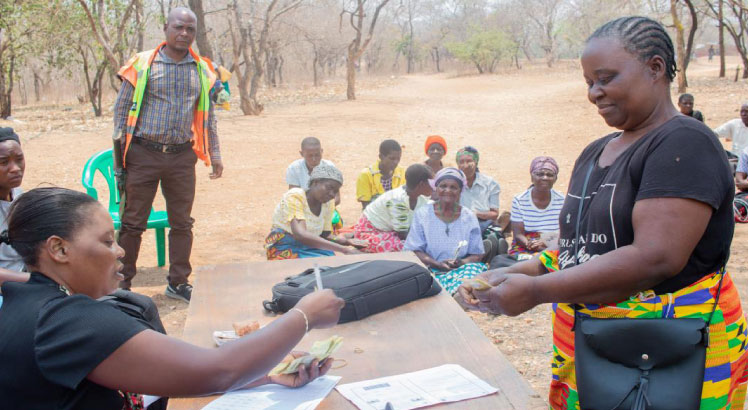Amid disasterous impacts of Cyclone Freddy, our Staff Writer JAMES CHAVULA highlights how a mix of community dialogues and vulnerability rankings helped identify deserving recipients of emergency aid in the wake of a similar tragedy last year.
On a sunny morning, Rosemary Govati fished her national identity card from a plastic carrier bag tucked in her armpits. In no time, the recipient, a social welfare official from MwanzaDistrict Council, scanned it to figure out how much she would receive.
Standing in the shade of a mango tree, the 58-year-old mother of four smiled after learning the sum awaiting her at the end of the next queue.
“Are you sure it’s K54 000 and the usual cash transfers?” she asked her helper before switching to the forming line where a cashier was finger-pointing beneficiaries names on a shortlist before paying them out.
Next to the cash desk, a member of Njanjama Village Civil Protection Committee in the border district verified the payouts, recounting the banknote for transparency.
“This is the greatest support I have received since Tropical Storm Ana destroyed my home and property on January 24 2022,” said the woman from Njanjama Village in Traditional Authority Nthache.
Joyce Machinjiri smiles after receiving the emergency cash support in Neno
The K54 000 top-up on the monthly social cash transfers she had been getting since 2018. The addition worth K18 000 a month was part of the three-month flood recovery support funded by the European Union to support vulnerable households in districts hit the hardest by Tropical Storm Ana and Cyclone Gombe early last year.
Unicef provided technical support to the Government of Malawi to ensure the support reached those most in need and at risk of sliding into deeper poverty.
According to the Department of Disaster Management Affairs, the cyclones affected nearly one million people in 16 districts, leaving 190 429 displaced, 46 dead, 206 injured and 18 missing.
“It hasn’t been easy to rise from the destruction caused by the heavy rains and winds which persisted for two days. The house I built using my monthly social cash transfers fell apart and all belongings were destroyed in a single night,” she recounts.
The loss included four goats, 15 chickens, kitchen utensils as well as a field of bananas and sugarcane buried in silt.
Beaming with a smile, she stated: “I will buy food for my family as well as soap and clothes for my school-going son, Peter.
“Education is key to a bright future, so I don’t want my son to feel sad or miss classes because of hunger and poverty. I want him to complete school and achieve his dreams.
Peter’s 22-year-old brother, Ernest, dropped out because of mobility problems and his 24-year-old sister, Rosby, due to poverty and epilepsy,explains the granny.
Rosemary feels only the most in need households received the emergency cash support because the selection process was open to public debate, transparent and fair.
She recalls: “A day after my house fell apart, the VCPC members made door-to-door visits to gauge the loss, then sent a list to the district council which later deployed a team to ascertain the severity of the damage.
“Afterwards, they listed the worst affected households and convened a meeting where we publicly discussed and chose those who were in dire need of assistance. There was no secrecy, fear or favour. It happened in the open, not in the dark”
Agnes Salanje, 31, sits on the committee of 14, which coordinates disaster preparedness, early warnings and response in the village.
She was at the centre of the house-to-house assessments, launching the community-based selection of beneficiaries of the emergency support.
The volunteer explains: “Our area was hit by heavy winds and rains simultaneously, so we reached every household to assess the damage.
“We worked closely with village heads to mobilise heads of the most affected households. During the meeting, the well-off with alternatives stepped aside to pave the way for those in dire need.”
The locals and their committee, the frontline workers during emergencies, found it easy to eliminate biases because they know each other well.
The council cross-checked the names identified through community-based targeting on the emergency management information system, which ranks households according to specific criteria, including housing condition, food security and members with disability.
Mwanza District Council director of planning and development Ernest Kadzokoyasays the flood recovery support helped boost the restoration of livelihoods in households hit hard by the cyclones.
“Mwanza was one of the most affected districts and the response was challenging, but we supported the affected households to conduct needs assessment and provide food, temporary shelter, utensils and other necessary items and services,” he explains.
Kadzokoya says community-based targeting helped identify the voiceless most in need, with the field trips ascertaining the situation on the ground.
He explains: “It is important to collect and validate data because the flood recovery support only targets 10 in every 100 affected households. This wouldn’t have been easy without a verifiable system to remove biases and identify the most deserving, ultra-poor households.”
The district economic planner recommends the use of the dual system for selecting beneficiaries of social protection programmes.
“This should be the way to go. We have tried other systems, but they didn’t work. With the current system, there were no queries. Everybody seems satisfied.”
The post Putting humanitarian aid in deserving hands first appeared on The Nation Online.
 Moni Malawi
Moni Malawi 

